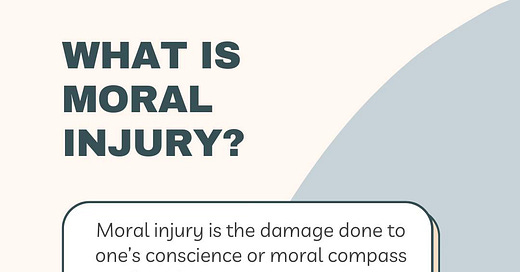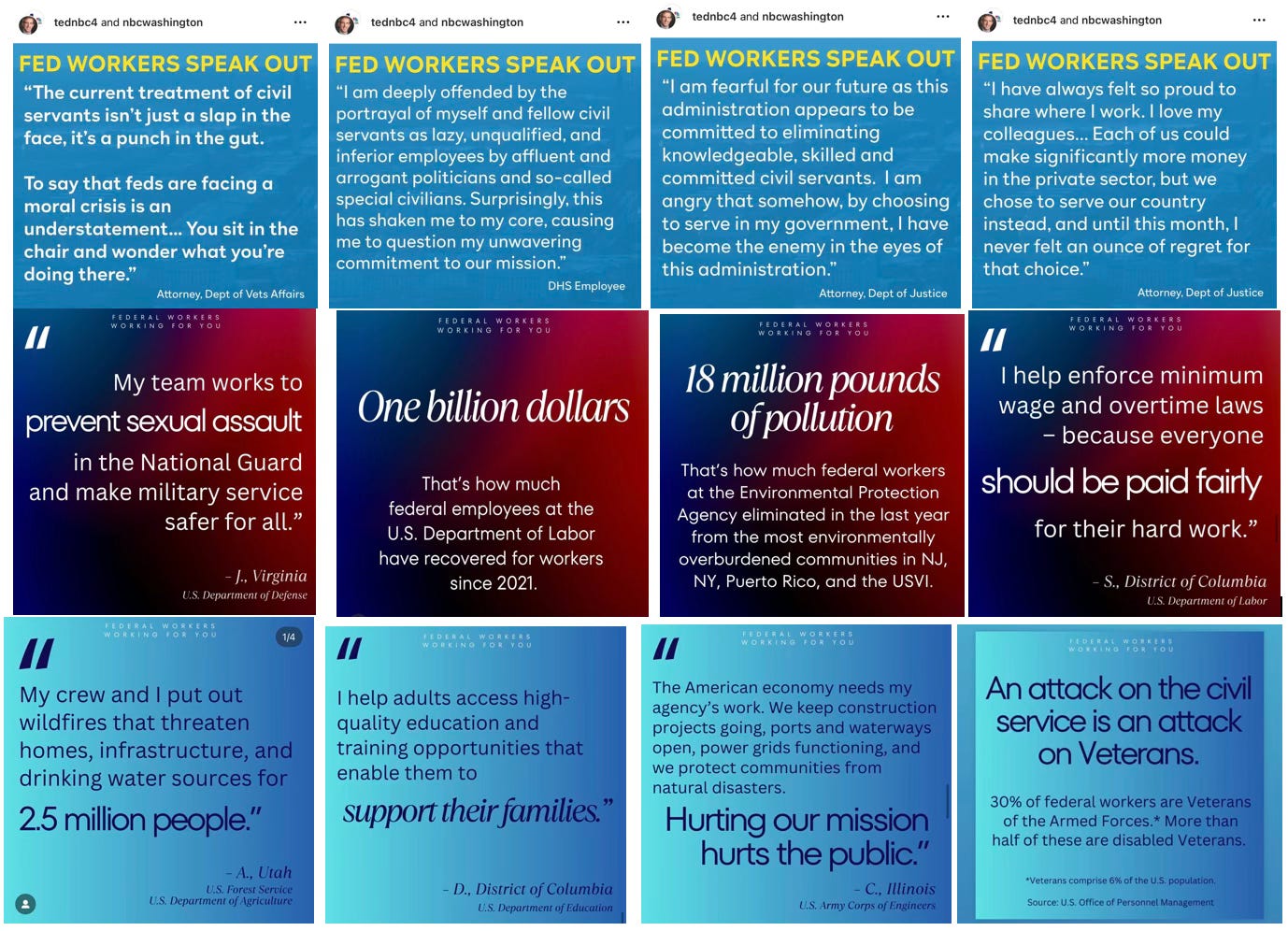“How are you doing?,” my supervisor asks gently.
He doesn’t often check in with me—I’ve spent half my career under his supervision, so he doesn’t really need to—but things are different now.
I’m unsure of how to answer. “It’s a tough time to be a fed,” is all I say. But we lock eyes through the screen and the silence that follows speaks volumes.
“It sure is,” he says. And that’s that.
-------
I’ve spoken at length about moral injury over the past three years. Through articles and podcasts, I’ve tried to help people understand what it is (the psychological harm caused when someone perpetrates, witnesses, or fails to prevent an act which violates their moral code), how it affects people (it can cause symptoms similar to PTSD in nature, scope, and severity), and why it has impacted our veteran community so deeply (this one requires far more than a parenthetical).
Historically, I’ve shared other people’s stories as a way to get my point across. Sure, I suffered my own moral injury after the U.S. military withdrawal from Afghanistan. I can recall the exact moment I saw the scenes from Abbey Gate unfold from my living room, my heart pounding at the utter depravity playing out on my TV screen. As someone who cares about veterans and servicemembers, I knew those communities were in trouble. As someone with a moral compass, I knew that what I was seeing was wrong.
But our withdrawal from Afghanistan affected me far less intensely than it did my military peers: the men and women who endured multiple combat tours, critical injuries, and extended absences from their families who now had to watch their own government undermine their personal integrity, life’s work, and commitment to their Afghan brothers- and sisters-in arms.
I can relate to them more deeply now.
I’ve been an attorney with the federal government for nearly a decade. I work in the field of veterans law, primarily dealing with disability benefits.
(My writing here reflects my personal views and beliefs, and does not represent those of my employer.)
I won’t lie: the job is tough. I’m beholden to weekly production requirements (i.e., I have to produce a certain amount of work material per week to keep my job); I’ve spent ten years becoming intimately familiar with the brutal ways in which military service can harm bodies and minds; and many veterans have waited years for an outcome by the time their case reaches my desk, so their gratitude for my department’s work is understandably muted if not replaced by outward hostility.
Equally as true is that I love my work. It is a genuine privilege to support veterans, and I believe the majority of my peers feel the same way.
It’s a sentiment shared by the civil servant community at large. The truth is, there’s not much glory to be found in federal work. The paychecks can be nominal and there’s no political power to be gained from these roles. Instead, we show up each day for far more honorable reasons: a genuine commitment to the greater good and a self-driven duty to serve.
Feds go to work so that you can have access to meaningful and affordable healthcare and housing. We go to work so that you can enjoy clean and safe national parks. We go to work to protect our national borders, foreign relationships, and due process; to perform life-saving research and preserve our nation’s history; to ensure that veterans survive post-service and the elderly are treated with dignity and care.
We go to work because we believe in our country. Over the past month, it’s become increasingly clear that those in charge of our country no longer believe in us.
I’m one of the lucky ones - I still have a job (for now). Every morning, I log into my email and scan the subject lines for evidence that I’ve been let go. This worry is compounded by the recent unidentified deletion of all personal files from my desktop, which included every personnel document and annual review from my ten years on the job. Throughout the day, my thoughts are punctuated by a carousel of concerns about my own survival:
“Will I be able to find a job if I’m fired?”
“How quickly would I need to apply for public aid if that happens?”
“How would I make my mortgage payments?”
“What if there’s an emergency with my kids?”
“How will I cover my medical costs as someone with a chronic illness?”
“What is going to happen to my Public Service Loan Forgiveness application?”
“What am I even doing here?”
Again . . . I’m one of the lucky ones.
I’m luckier than Brian Gibbs, a former education ranger who was included in the roughly 1,000 National Park Service employees recently laid off. In a Facebook post from the day he was let go, Brian pleaded with his fellow Americans not to look away:
Please know and share this truth widely:
I am a father, a loving husband, and dedicated civil servant.
I am an oath of office to defend and protect the constitution from all enemies foreign and domestic.
I am a work evaluation that reads “exceeds expectations."
I am the "fat on the bone."
I am being trimmed as a consequence of the popular vote
I am a United States flag raiser and folder
I am my son's "Junior Ranger" idol
I am of the place where I first told my spouse I loved her
I am a college kid’s dream job
I am the smiling face that greets you at the front door
I am your family vacation planner
I am a voice for 19 American Indian cultures
I am the protector of 2500 year old American Indian burial and ceremonial mounds
I am the defender of your public lands and waters
I am the motivation to make it up the hill
I am a generational cycle breaker
I am the toilet scrubber and soap dispenser
I am the open trail hiked by people from all walks of life
I am the highlight of your child’s school day
I am the band aid for a skinned knee
I am the lesson that showed your children that we live in a world of gifts- not commodities, that gratitude and reciprocity are the doorway to true abundance, not power, money, or fear.
I am the one who taught your kid the thrush’s song and the hawk’s cry.
I am the wildflower that brought your student joy
I am the one who told your child that they belong on this planet. That their unique gifts and existence matters.
I am an invocation for peace
I am gone from the office
I am the resistance
But mostly I'm just tired.
I am tired from weeks of being bullied and censored by billionaires
I am tired of waking up every morning at 2am wondering how I am going to provide for my family if I lose my job
I am tired of wiping away my wife’s tears and reassuring her that things will be ok for us and our growing little family that she's carrying.
Things are not ok. I am not ok.
I’m luckier than the friend of a friend who recently uprooted her entire family and moved to a foreign country last November to begin a role in the U.S. Agency for International Development [USAID]. She was unceremoniously fired and then scheduled for a military flight back to the U.S. just days later, where her family is without jobs or a home.
And I’m luckier than the anonymous veteran who specifically sought employment at the Department of Veterans Affairs [VA] so that he might continue to serve his peers– “service after service,” he said. His capacity to seek support is limited by the same round of layoffs which cost him his job, as multiple employees from the Veterans Crisis Line–which offers 24/7 support to veterans in crisis–were also let go. This is critically important, as there is evidence that job loss can increase suicide risk by up to 87 percent.
In fact, while statistics vary, I appear to be luckier than the
“Dozens” of employees fired from the Department of Education;
100 from the General Services Administration;
200 from the Office of Personnel Management;
388 from the Environmental Protection Agency;
400 from the Department of Homeland Security;
700 from the Centers for Disease Control;
720 from the Small Business Administration;
1,000 from VA;
2,000 from the Department of Energy;
2,300 from the Department of the Interior;
6,000 from the Internal Revenue Service; and
More than 10,000 from USAID.
And that’s the moral injury of it all.
The federal workforce currently stands at 3 million employees. That’s three million people who dedicated their careers to public service and now face the painful reality of losing their livelihoods while grappling with a profound betrayal from a system they’ve long supported. It is a betrayal of their sense of purpose, duty, and trust in a system that promised to uphold the American principles of integrity and respect. With 20,000 employees now fired and more dismissals to come, we must confront the deep psychological and ethical toll these layoffs have exacted.
Perhaps even more painful is that this mass trauma is deliberate. As much as we’re told that this campaign against federal employees is about eliminating waste, the methods employed to achieve this goal leave no room for doubt: cruelty is the chosen weapon. In a public statement by the new head of Office of Management and Budget, Russell Vought stated as follows: “We want the bureaucrats to be traumatically affected. When they wake up in the morning, we want them to not want to go to work, because they are increasingly viewed as the villains. We want their funding to be shut down . . . we want to put them in trauma.”
This moment in history is not just about job loss; it is about the erosion of morale, dignity, and faith in a system that should value those who serve it. Our sacred institutions have imparted a deep moral injury, leaving those who once devoted themselves to public service abandoned and betrayed by the very system they upheld. Where can you possibly go from here?
There’s a clear answer to that question, but it’s a scary one. We are on the precipice of a mental health crisis, faced by some 3 million Americans whose careers have been reduced to “fat” and “waste” by a group of leaders who seem to care very little about serving their country. In the process of losing our jobs and livelihoods, we have endured such indignity and fearmongering that it has stripped away any belief that our work held meaning or value for the communities we once served. In the face of this government-led dehumanization campaign, we are left to wonder: what remains of our purpose, and what hope is there for recovery?
(Disclaimer: Yes, I am scared to publish this piece. But as my new t-shirt says,
Available for purchase here.
And if you’re thinking of reporting me: thank you for caring! I’d first recommend that you check out the laws regarding federal employees and free speech here.)







This is really great work Kate. Thank you for sharing your story and the story of others.
Thank you for taking the time and courageously writing this. And thank you for your service.